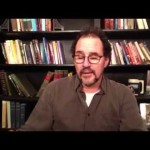We run our website the way we wished the whole internet worked: we provide high quality original content with no ads. We are funded solely by your direct support. Please consider supporting this project.
Doesn’t the open view demean God’s sovereignty?
The Open view demeans God’s sovereignty only if one assumes that “sovereignty” means “meticulous control.” By why think this is the way God wants to rule the world? The biblical narrative presents a God who gives humans (and apparently angels) free will, who is flexible and creative in running the world, and who relies at least as much on his wisdom as he does his power. (Think about it–if God controlled everything he’d never have to rely on his wisdom at all).
This view of sovereignty, I would argue, is much more exalted than a meticulously controlling view. In the open view, God is free to determine some aspects of the future according to his will and to anticipate and address his creatures’ choices within the parameters he has established for them. He is free to cultivate real, meaningful and transforming relationships with them, to respond to their fervent and effectual prayers, and even to empty himself and become one of them in the person of Jesus Christ so that they could be reconciled to him. God’s sovereignty is not threatened by these things—rather, it is amplified all the more by them. A smaller god would feel threatened if he didn’t meticulously control everything. The confident God of Scripture is not.
Category: Q&A
Tags: Open Theism, Q&A
Topics: Open Theism
Related Reading

How do you respond to 1 Timothy 4:1–3?
“…in the later times some will renounce the faith by paying attention to deceitful spirits and teachings of demons, through the hypocrisy of liars whose consciences are seared with a hot iron. They forbid marriage and demand abstinence from foods…” New Testament authors considered themselves to be living “in the later times” (e.g. Acts 2:17;…

Reasons God Does Not Control Everything
First, the belief that God is all-powerful does not mean that God exercises all power. It only means that God is the ultimate source of all power. Fallen people may value the ability to control others and project this attribute onto God (Matthew 20:25-28). But the cross breaks all of our fallen assumptions about what…

God Clearly Can, So Why Doesn’t He? (podcast)
Leah expects more from God. Should she? Greg confronts God’s inactivity and underperformance. Episode 510 http://traffic.libsyn.com/askgregboyd/Episode_0510.mp3

Free Will: The origin of evil
In this continuing series on free will, Greg discusses how evil can only be accounted for if we acknowledge free will. This is especially true if you believe that God is good.

What is the significance of 2 Samuel 24:17–25?
“So the Lord answered [David’s] supplication for the land, and the plague was averted from Israel.” The passage suggests that the Lord intended the plague to judge Israel further but David’s supplication persuaded him to change his mind and relent from his punishment. If the future is to some degree open and God is genuinely…

How do you respond to Proverbs 16:4?
“The Lord has made everything for its purpose, even the wicked for the day of trouble.” Calvinists often cite this verse to support the conclusion that some people are created wicked for the expressed purpose of being sent to hell. Since Scripture teaches that God is love (1 John 4:8, 16), that God loves all…
